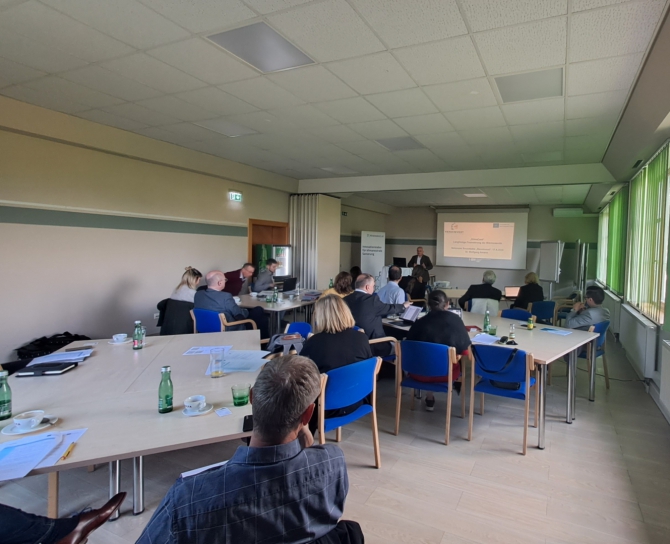
Summary of the 1st Austria National Renoinvest Roundtable
Organizer: Renowave.at with the contribution of IIBW
Date: April 17, 2024
Location: Hotel Garni, Leibnitz/Styria
Mode: In-person (Face-to-Face)
Attendees: 21 participants, including 5 financial actors
The 1st National Renoinvest Roundtable was held on April 17, 2024, at Hotel Garni, Leibnitz, as part of the RENOINVEST project, aimed at advancing the decarbonization and renovation of Austria’s building stock. The event brought together 21 key stakeholders, including government representatives, financial experts, and professionals from the construction and renovation sectors, to discuss strategies for overcoming challenges in sustainable building renovations for both the public and private sectors.
The event began with a welcome speech by Mag. Michael Sebanz, Head of the Energy and Housing Department of the Styrian Provincial Government, who provided an overview of Styrian housing subsidy programs and the region’s focus on renovation. This was followed by a presentation of the RENOINVEST project and an introduction to the core project team by Susanne Formanek, Christina Böckl, and Wolfgang Amann.
Key Insights from the Keynote Speakers
Wolfgang Amann: Financing the Energy Transition
Wolfgang Amann, representing the Austrian Federal Ministry for Climate Protection, outlined Austria’s financial needs for decarbonizing the building sector, stressing that an investment of €80 billion would be required by 2040 to meet energy transition goals. The majority of this funding is expected to come from CO2 tax revenues and EU funds, emphasizing the critical role of regional cooperation. He introduced the “KlimaCent” initiative, aimed at reducing greenhouse gas emissions through targeted funding programs for renovation projects.
Nate Wyne: Balancing Sustainability and Profitability
Nate Wyne, CEO of Renowave, discussed the challenge of balancing sustainability with profitability in construction projects. He argued that adopting new technologies and better sustainability data are essential for ensuring competitiveness in the renovation sector, while reducing its carbon footprint. Wyne also highlighted the need for innovation and data-driven approaches to meet regulatory changes and rising costs in Austria and Slovenia’s renovation markets, as well as the importance of transparency in tracking sustainability outcomes.
Andreas Piontek: Technical Assistance for Large-Scale Renovations
Andreas Piontek, from the European Investment Bank (EIB), explained the opportunities offered by the ELENA program, which provides technical assistance for large-scale renovation projects. He discussed how bundling smaller renovation projects could help meet the financial thresholds necessary for receiving grants, providing municipalities with valuable opportunities to undertake green renovations despite budget constraints.

World Café Discussions: Public and Private Sector
The afternoon sessions were dedicated to in-depth World Café discussions, where stakeholders brainstormed solutions to key challenges related to both public and private sector roles in achieving sustainable renovation targets.
Public Sector Challenges and Solutions
A key theme in the public sector discussions was the need for mandatory renovation rates (3%) and the role of local, regional, and federal governments in leading the decarbonization of public buildings. Participants agreed that the public sector must set an example by ensuring municipal and public buildings comply with strict energy efficiency standards. Experts also emphasized the need for streamlined processes and support systems to help local authorities implement large-scale renovations more easily.
Private Sector Challenges and Solutions
Discussions on the private sector focused on integrating green bonds into financing models and developing clear sustainability criteria for investors. Participants agreed that improved data, clear guidelines, and more transparent systems for reporting sustainability efforts would help unlock investment in energy-efficient buildings. AI and data analytics were identified as valuable tools for managing subsidies and ensuring that renovation projects are adequately funded and aligned with sustainability objectives.

ELENA Program
The event concluded with a focus on the ELENA program, which plays a critical role in providing technical assistance for large-scale renovation projects. Discussions between the public and private sectors highlighted challenges, such as securing funds for preparation and meeting tendering requirements. Despite the program's potential, obstacles remain, particularly for non-profits and private property owners. Private entities often face difficulties in providing bank guarantees, while municipalities struggle to secure the upfront investment needed for preparatory work. Nevertheless, the ELENA program can provide the necessary support to overcome these hurdles.
The Path Forward
The RENOINVEST event concluded with a shared understanding that decarbonizing the built environment is a pressing and complex challenge that requires collaboration, innovation, and new financing mechanisms. Key takeaways included:
- The need for significant investment, particularly in energy-efficient renovation projects.
- The importance of transparent sustainability data and the role of new technologies.
- The potential for combining smaller projects to meet financial thresholds for public grants.
- The crucial roles of both the public and private sectors in driving the energy transition forward.
The RENOINVEST project will continue engaging stakeholders through working groups focused on staged renovation, circular economy solutions, and energy communities. Participants expressed interest in further developing these areas to ensure the successful implementation of Austria's building renovation and decarbonization goals.
Did You missed the event, or would like to check the presentation and know more about it? Please find the presentations from the event here:
Ulla Unzeitig, RENOWAVE.AT: One-stop-shop approach in Austria, RenoBooster
Leistbares Wohnen- Renovation Funding
Dr. Wolfgang Amann: National Roundtable, KlimaCent
Long-term financing of the heat transition
